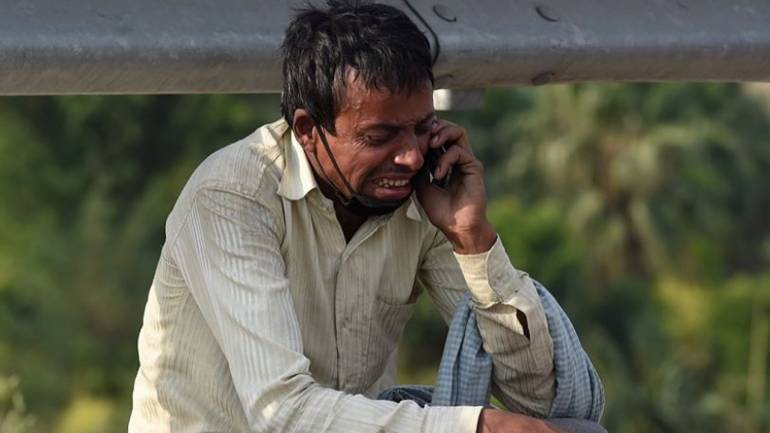For those who have been relaxing in their homes with comfort and with all the access at the hand reach and for those who have been confined in their homes in the wake of nationwide lockdown by missing the celebrations and get together parties, you must at least feel blessed that the lockdown had postponed your plans, but on the other side of the world, the lockdown has been triggering massive hunger and humanitarian crisis in which you are neither a part nor you would wish to be.
Rampukar Pandit has become the synonym of the plight and pain of the migrant workers and the hardship they have been endured on them in the wake of nationwide lockdown. The sequel of the lockdown had disconnected the workers from their families that are miles away. Rampukar Pandit is one of the thousands of workers who got stranded away from his family and he couldn't be with his son while he was breathing his last.
PTI Photojournalist Atul Yadav had seen Pandit with the grieving face on the Nizamuddin Bridge, Delhi, last week and the image had become a strong proof of the plight of the migrant workers. Pandit was in the place which is about 1,200 kilometers away from his hometown of Begusarai, Bihar and he decided to see his dying son by walking such a Himalayan distance as he has left with no pay and no transportation channels. When the photo was clicked, he was crying and speaking over the phone as his son has been departing.

Pandit got stuck at the Nizamuddin Bridge for three days as the police officials had barricaded his travel. The photo went viral across social media and the photojournalist had offered him help by taking him in his car. However, the police denied the photojournalist and finally, Rampukar got help from a woman who gave him food, financial aid of Rs 5,500, and booked a ticket in the Shramik special train following which he reached Bihar.
However, hours after the photograph was taken, he was informed that his son has died and his toughest passage had ended with more pain. Upon arriving in his home state, he was taken to the screening facility and he has currently been kept under quarantine since Sunday and he's yet to be united with his family. Speaking to PTI, Pandit said, "We, laborers, have no life, we are just a cog in the wheel, running continuously until we run out of life".
He stated that his demised son hadn't turned one-year-old and he pleaded to the police authorities to permit him to go home. However, no one has helped. "One policeman said, 'Will your son become alive if you go back home. This is a lockdown, you cannot move", Pandit adds as he shared how his hope had gone disgruntled. " I named my son Rampravesh since my name has Ram in it" Pandit says.
He further stated that rich people will get all access, they would be rescued and brought home in planes from abroad and poor migrant workers have left to fend for ourselves. Rampukar's wife and one of his daughters visited him at the hospital. However, the social distancing norms had fenced them from getting united. " We were all crying and we wanted to hug each other. I wanted to hold my daughter" he adds with more grief.
Rampukar Pandit (38) is the breadwinner for his family. He has moved to Delhi's Uttam Nagar during his childhood and he has been working as the construction laborer at a cinema hall site in Delhi. He has been surviving with his wife, three daughters, and one son- who died without having his father near him.
Rampukar Pandit is one of the testaments for the plight of the migrant workers as these people are the ones who hit hard by the lockdown - more harder than the pandemic as the lockdown hasn't only physically distanced these workers but it also has mentally and emotionally disturbed them. India has been witnessing more deaths of the migrants amid lockdown and besides testing the medical capabilities, this pandemic has also been testing the capabilities of how we address such uncertain crisis and how we are providing antidotes for such stranded fellow humans.
Fears and Tears have become assets of the migrant workers and Pandit's story has alarmed the government that its time to act now, if not now, when?









Comments